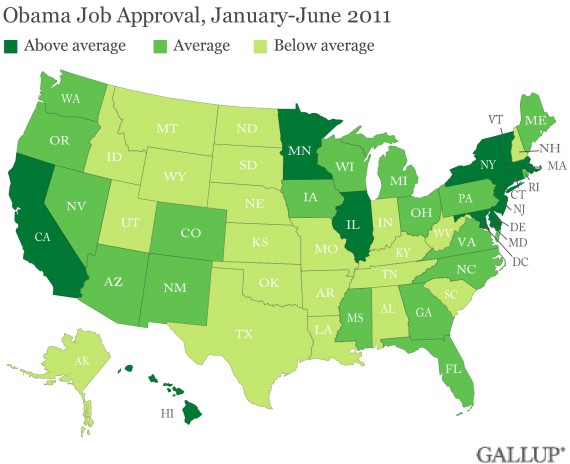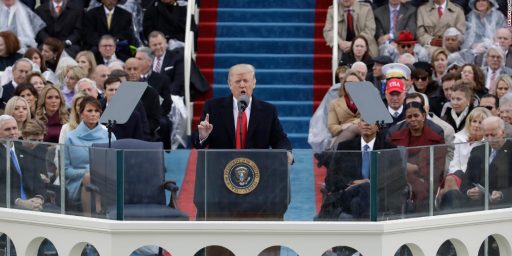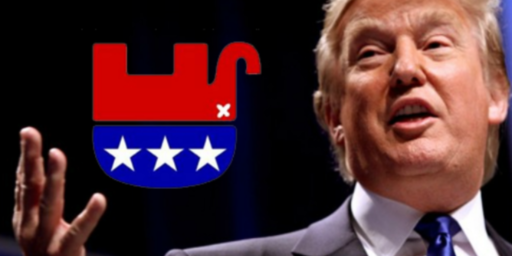State Polls Show A Tough Electoral Map For Obama
State-level job approval numbers seem to suggest that the President could have Electoral College worries in 2012.
Keeping in mind the caveat that James Joyner noted last week that it may well be ridiculously early to start looking at Electoral College scenarios for the 2012 election, National Journal notes that a new set of state polls from Gallup seems to indicate that the President will have a tougher time putting together a winning Electoral College map this time around:
Newly released state-by-state approval numbers for President Obama suggest that in 2012 he could face fewer options for assembling an Electoral College majority and increased pressure to capture racially diverse states. As a result, Colorado, Virginia, North Carolina, and Florida, among others, appear to be evolving into critical battlegrounds on the campaign map.
The polling results, released earlier this week by Gallup, underscore both the stability of each party’s Electoral College base and the shifting roster of swing states that could decide the 2012 contest.
In all, the compilation shows that Obama’s approval rating exceeds his disapproval rating in states with 301 Electoral College votes–well down from his 365 total in 2008 but still enough to win. That total, however, includes North Carolina, where Obama’s approval and disapproval ratings are virtually even, and Georgia, where Republicans remain skeptical that he can seriously compete, despite signals from his reelection campaign that it intends to. If those two are removed from the list, the states in which Obama’s approval number exceeds his disapproval rating provide exactly 270 Electoral College votes, the bare majority needed to win.
The bad news for the President, though, is that his approval rating is slipping and, if that continues to happen, he could have a real problem getting to 270:
If Obama’s national approval rating next fall remains around its current 42 percent, it’s almost inconceivable that he could win enough states to assemble an Electoral College majority. But if the president manages to restore his national approval rating to at least the 47 percent level reflected in the Gallup results, the state-level breakdown offers a preview of what the map might look like in a competitive race.
At that level of national support, the Gallup numbers show, Obama’s potential 2012 map features elements of stability — albeit, at a lower baseline than in 2008. Obama’s approval rating in the Gallup compilation trailed his 2008 share of the vote in every state except Alaska, Louisiana, Mississippi and, intriguingly, Georgia. Most of the sharpest declines have come in states that Obama won last time, including New Hampshire, Oregon, Rhode Island, Vermont, New Mexico, and Nevada.
Chris Cillizza looks as the numbers and sees the 2012 race coming down to a group of ten swing states, far fewer than were in play in 2008:
New Gallup numbers tracking President Obama’s job approval rating in each of the 50 states makes clear that the 2012 election will almost certainly come down to ten swing states.
In each of those ten states — Iowa, Pennsylvania, Florida, North Carolina, Virginia, New Mexico, Ohio, Nevada, Arizona and Colorado — the President’s approval rating is somewhere between 44 percent and 49 percent.
All told, the states will dole out 148 electoral votes, more than half of the 270 total that either nominee will need to claim the presidency next November. In 2008, Obama won nine of the ten — losing Arizona due in large part to Sen. John McCain’s homestate appeal.
Frankly, I cannot see Arizona being a true swing state. A Democrat hasn’t won Arizona in a Presidential election since 1996, and the state has seemingly become more conservative and more Republican in the years since then, and George W. Bush actually beat John Kerry in 2004 by a slightly wider margin than the one by which John McCain won the state in 2008. Moreover, the continuing immigration controversy in that state, along with the Federal Government’s lawsuit against the what is by all measures a popular law, seems to make it unlikely that the President has a realistic chance of winning that state next year. Nonetheless, the rest of Cillizza’s list seems in order, and the fact that other states that Obama was able to swing into his corner, like Indiana, are not on the list seems to support the idea that the 2012 race is likely to be fought out on a much smaller playing field than the one candidates faced in 2008.
Cillizza’s fellow Washington Post political pundit Greg Sargent, though, says we should just ignore the state-level polling altogether:
If you’re running a presidential campaign, you obviously need to make choices about where to put resources, and you certainly should be reading the polling, even this early – although it’s likely that you’ll mostly just want to look at the previous cycle. But if you’re trying to predict results, the odds are that you’re going to get far more confused by looking at state data. For example, Gallup is using data collected over six months to keep the margin of error low. But which tells us more about, say, Pennsylvania right now: a six-month average of Pennsylvania respondents, or a good estimate of today’s national approval rating adjusted by the difference between how Obama did nationally in 2008 and how he did in the Keystone State in 2008? My money would be on the latter.
The larger point is that trying to get the states exactly right at this point is mostly a waste of time. If Barack Obama reaches November 2012 with a 40 percent approval rating, he’s toast; if he rallies from his current low-to-mid 40s and tops 50 percent approval, he’ll win.
(…)
If, after Labor Day 2012, the national numbers show a very close race . . . that’s about when it’s worth starting to pay attention to the battleground states.
For the most part, Sargent is correct. Using approval numbers to try to post re-election odds is problematic at best, and may be entirely worthless given the fact that there’s no Republican nominee to compare Obama’s numbers to at this point in time. Nonetheless, those numbers do seem to show us that, absent a dramatic turnaround in the economy that boosts the his approval numbers, Barack Obama is going to have a tough time getting to 270 Electoral Votes this time around.
Graphic via Gallup







And here’s a rebuttal from Ramesh Ponnuru, of all people…
Haha,
Onama is a mortal lock for reelection.
Amateur pundits should have to pay a $1 to charity to make posts like this.
No candidate can win without carrying at least 1 southern state. NC and Virginia? Forget it.
Florida? close, but still looks GOP.
As far as some of the other states: Ohio and Penn. will easily go Republican. Even California could be close: some polls show widespread dissatisfaction – high taxes, heavy government, unemployment very high.
Presidential elections almost always boil down to a simple binary equation: Candidate X or Candidate Y. And that means there has to be enough of the “I want Candidate X” and the lesser but still significant “I really, really, really don’t want Candidate Y” to determine the winner.
No candidate can win based purely on the first factor, and Obama especially so. But without a name to fill in against him, there’s no solving the equation.
J.
Wouldn’t that indicate that the Dems are trending better in AZ?
I am not sure how much job approval is going to matter. I think there are people who may not like Obama’s performance but it isn’t going to translate into a vote for somebody other than Obama.
I suspect the race is going to be tighter and a little more difficult for Obama in 2012, but I suspect he ends up winning barring further economic collapse or some other really awful event that exposes further his lack of leadership ability.
Yet again it needs to be stated that anyone who actually believes that California will be a tossup state in the presidential election next year really cannot be taken seriously…
A “lack of leadership ability” compared to whom? His illustrious predecessor? Or perhaps the sterling opposition who ran against him in 2008…
I’ve said it before I’ll say it again, the Republicans still have to have a candidate that people think can do a better job than Obama. At this point I don’t see that happening. Romney has the best chance but he has enough skeletons in his closet to fill a cemetery. He got rich killing jobs something that will be easy for the Democrats to use against him.
@Catfish: Wow. Do you know as little about politics as you do about California?
@WR: Do you recall the last time you said anything of substance, and not just ad hominem attacks?
STILL waiting for your response on the Wisconsin cleanup costs… you remember, when I said it ran “hundreds of thousands of dollars,” and when you called me a liar, cited two sources pegging it at between 270K and 350K, and you then… well, said nothing.
J.
What people dont realize about deep southern states is that Obama has both a high floor on his approval rating and a low ceiling. It is all because of the high percent of black voters.
The Dem Party in GA is completely dysfunctional and disorganized. They couldnt get more than 43% of the vote in any statewide race in 2010.
Obama wont win GA, but he wont get less than 46-47% either.